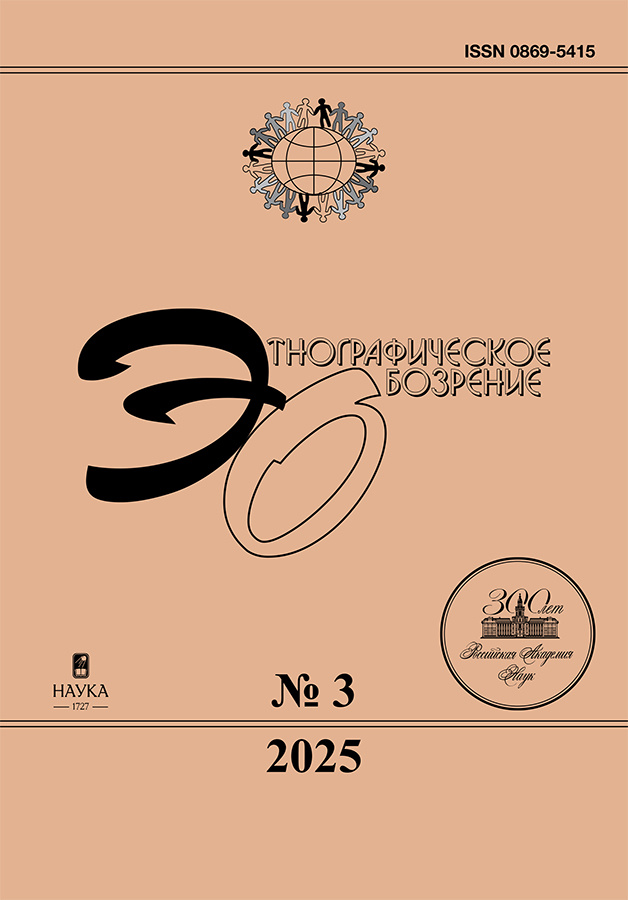The phenomenon of “μάγκας” in the emic vision of Greeks
- Авторлар: Sidneva S.A.1
-
Мекемелер:
- Lomonosov Moscow State University
- Шығарылым: № 3 (2025)
- Беттер: 18-30
- Бөлім: Special Theme of the Issue: Anthropology of Criminality: Delinquence as a Component of Traditional Culture in the Past and Present
- URL: https://kazanmedjournal.ru/0869-5415/article/view/689589
- DOI: https://doi.org/10.31857/S0869541525030024
- EDN: https://elibrary.ru/MSTUFD
- ID: 689589
Дәйексөз келтіру
Аннотация
The article discusses μάγκας – a sociocultural phenomenon that arose in the lower-class milieu of Greek port cities in the late 19th – first half of the 20th century. It was in that period that the criminalization of port cities occurred due to the impoverishment of the rural population as a consequence of urbanization and its resettlement in search of a better life in larger cities and towns, but mainly due to the Asia Minor catastrophe of 1922, which caused an influx of refugees from Smyrna (Izmir) and its environs to Athens and Piraeus. Mάγκας is a polysemantic word that is difficult to translate from Greek and that has gone over time beyond its originally negative meaning. In this case, we can observe an evolution and metamorphosis of the concept: from a declassed criminal or semi-criminal element, a vagabond, a loafer, sometimes a thief and smuggler, a regular at cheap tekes (hashish dens) in Piraeus, who typically confronts the police, he turns into a brave bully-guy from the ordinary people, who does not place much value on material goods, or sometimes into a virtuoso musician and dancer who performs rebetika, which itself played a significant part in the romanticization of the image of μάγκας. While much of the scholarly work has been commonly focused on Greek rebetika and its development from the folk song to the kind of “underground chanson”, which was initially despised and semi-banned in the official culture and later proclaimed a cultural heritage of Greece, I will specifically focus on μάγκας as the main figure of rebetika, examining his cultural life in a certain social environment and the ways he was perceived in Greek society.
Негізгі сөздер
Толық мәтін
Авторлар туралы
Svetlana Sidneva
Lomonosov Moscow State University
Хат алмасуға жауапты Автор.
Email: lucia80@mail.ru
ORCID iD: 0000-0002-2937-5434
к. филол. н., доцент кафедры итальянского языка факультета иностранных языков и регионоведения
Ресей, GSP-1, Leninskie Gory, Moscow, 119991Әдебиет тізімі
- Gotsinas, K. 2021. Epi tis ousiaas [About Drugs]. Thessaloniki: Panepistimiakes ekdoseis Kritis.
- Karapotosoglou, K. 1986. Syngritikes diereyniseis sta nea ellinika [Comparative Researches in Μodern Greek]. Lexigrafikon deltion Akademias Athinon 16: 267–268.
- Korovinis, T. 2005. I Zeimbeki tis Mikras Asias [The Zeimbeki of Asia Minor]. Athens: Agra.
- Petropoulos, I. 2011. Rembetologia [Rembetologia]. Athens: Kedros.
- Risto Pekka Pennanen. 1999. Westernisation and Modernisation in Greek Popular Music. PhD diss. abstract, Acta Universitatis Tamperensis.
- Tsaknis, N. 2016. I Enkuklopedia tou manga [The Encyclopedia of Mangas]. Athens: Kastaniotis.
- Tyrovola, V. 2003. Ellinikoi astilaikoi khoroi [Greek Urban Dances]. In Tehnes II: Episkopisi Ellinikis Musikis kai Khorou [Overview of Greek Music and Dance], edited by N. Gyftoulas et al., 125–151. Patra: ΕΑΠ; Τomoc E.
- Vasilieva, I.E., and M.L. Kisilier. 2019. Grecheskaia revoliutsiia kak kul’turnyi fenomen: k probleme formirovaniia kollektivnoi pamiati i lokal’noi identichnosti [The Greek War of Independence as a Cultural Phenomenon: On the Formation of Collective Memory and Local Identity]. Indoevropeiskoe yazykoznanie i klassicheskaia filologiia XIII: 135–160.
- Zaimakis, G. 2004–2005. Khasisoposia kai ntervisiliki sto Irakleio Kritis sto proto miso tou 20 aiona [Gasish Dens in Heraklion of Crete in the First Half of the 20th Century]. Ethnologia 11: 61–87.
Қосымша файлдар









